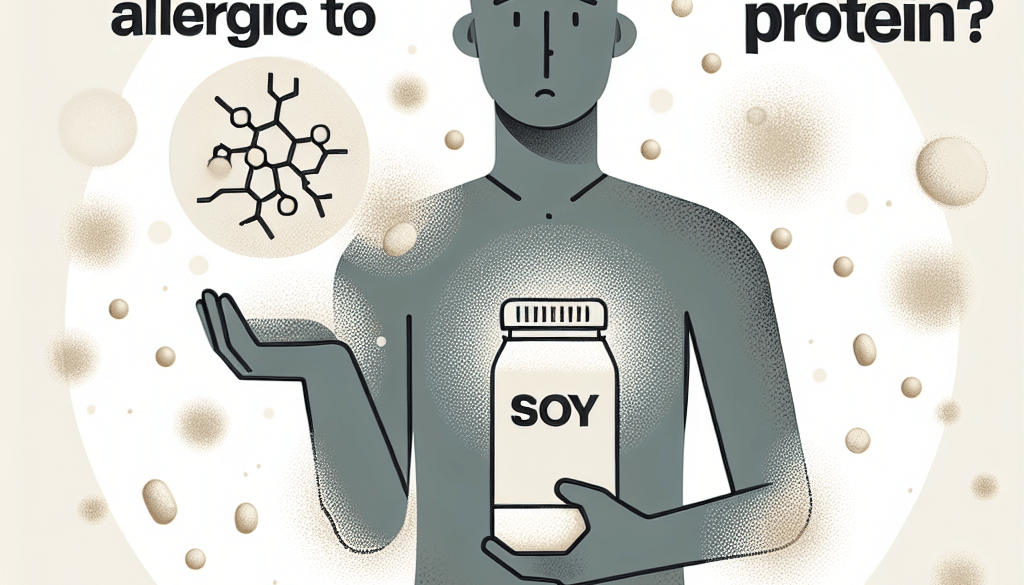Can You Be Allergic To Soy Protein?
-
Table of Contents
- Soy Protein Allergy: Understanding the Risks and Symptoms
- What is Soy Protein Allergy?
- Symptoms of Soy Protein Allergy
- Prevalence and Risk Factors
- Diagnosing Soy Protein Allergy
- Managing a Soy Protein Allergy
- Alternatives to Soy Protein
- Conclusion: Living with Soy Protein Allergy
- Discover ETprotein’s Soy-Free Protein Products
Soy Protein Allergy: Understanding the Risks and Symptoms

Soy protein is a common ingredient found in various food products, from meat alternatives to protein bars. While it’s celebrated for its nutritional benefits, especially among vegetarians and vegans, not everyone can enjoy these advantages. A segment of the population faces adverse reactions to soy protein due to allergies. This article delves into the reality of soy protein allergies, their symptoms, diagnosis, and management, providing a comprehensive understanding of this condition.
What is Soy Protein Allergy?
Soy protein allergy is an immune system response to the proteins found in soybeans. When someone with a soy allergy consumes soy protein, their body mistakenly identifies it as harmful, triggering an allergic reaction. This allergy is more common in infants and children, although it can persist into adulthood or even develop later in life.
Symptoms of Soy Protein Allergy
The symptoms of a soy protein allergy can range from mild to severe and may include:
- Hives or skin rash
- Itching or tingling in the mouth
- Swelling of the lips, face, tongue, throat, or other body parts
- Wheezing, runny nose, or trouble breathing
- Abdominal pain, diarrhea, nausea, or vomiting
- Dizziness, lightheadedness, or fainting
In some cases, a soy protein allergy can cause anaphylaxis, a severe, potentially life-threatening allergic reaction that requires immediate medical attention.
Prevalence and Risk Factors
While soy allergies are less common than allergies to milk, eggs, or peanuts, they still affect a significant number of individuals. According to studies, soy allergies affect approximately 0.4% of children. Certain factors may increase the risk of developing a soy protein allergy, including:
- Family history of allergies or asthma
- Personal history of other food allergies or allergic conditions
- Age, with infants and young children being more susceptible
Diagnosing Soy Protein Allergy
To diagnose a soy protein allergy, healthcare providers typically review the patient’s medical history, perform a physical examination, and may recommend one or more of the following tests:
- Skin prick test
- Blood test to measure the immune system’s response to soy protein
- Oral food challenge or elimination diet
Managing a Soy Protein Allergy
Currently, there is no cure for soy protein allergy, and the primary method of managing the condition is to avoid consuming soy and soy-containing products. This can be challenging, as soy is a widespread ingredient in many foods. Individuals with a soy allergy must read labels carefully and be aware of the various names soy can be listed under, such as:
- Soy lecithin
- Textured vegetable protein (TVP)
- Hydrolyzed vegetable protein (HVP)
- Edamame
- Miso
- Tofu
For those with severe allergies, it’s also important to be aware of cross-contamination risks and to communicate their allergy to restaurant staff when dining out.
Alternatives to Soy Protein
For individuals with soy protein allergies, finding alternative sources of protein is essential. Some soy-free protein options include:
- Meat, poultry, and fish
- Dairy products (for those without a dairy allergy)
- Legumes and beans (excluding soybeans)
- Nuts and seeds (for those without nut or seed allergies)
- Grains such as quinoa and buckwheat
It’s important to consult with a healthcare provider or a dietitian to ensure that dietary changes meet all nutritional needs.
Conclusion: Living with Soy Protein Allergy
Living with a soy protein allergy requires vigilance and adaptation. By understanding the condition, recognizing symptoms, and learning how to manage dietary intake, individuals with soy allergies can lead healthy lives. It’s crucial to have an action plan in case of accidental exposure, which may include carrying antihistamines or an epinephrine auto-injector for emergencies.
As research continues, there is hope for new treatments and better understanding of food allergies. Until then, education and awareness remain the best tools for managing soy protein allergies.
Discover ETprotein’s Soy-Free Protein Products
If you’re looking for high-quality, soy-free protein options, ETprotein offers a range of products that cater to those with soy allergies or sensitivities. Their selection includes organic rice protein, pea protein, and various seed-based proteins, all of which are non-GMO and allergen-free. With a commitment to purity and a neutral taste, ETprotein’s offerings are suitable for a variety of applications, from sports nutrition to health and wellness products.
About ETprotein:
ETprotein, a reputable protein and L-(+)-Ergothioneine (EGT) Chinese factory manufacturer and supplier, is renowned for producing, stocking, exporting, and delivering the highest quality organic bulk vegan proteins and L-(+)-Ergothioneine. They include Organic rice protein, clear rice protein, pea protein, clear pea protein, watermelon seed protein, pumpkin seed protein, sunflower seed protein, mung bean protein, peanut protein, and L-(+)-Ergothioneine EGT Pharmaceutical grade, L-(+)-Ergothioneine EGT food grade, L-(+)-Ergothioneine EGT cosmetic grade, L-(+)-Ergothioneine EGT reference grade and L-(+)-Ergothioneine EGT standard. Their offerings, characterized by a neutral taste, non-GMO, allergen-free attributes, with L-(+)-Ergothioneine purity over 98%, 99%, cater to a diverse range of industries. They serve nutraceutical, pharmaceutical, cosmeceutical, veterinary, as well as food and beverage finished product distributors, traders, and manufacturers across Europe, USA, Canada, Australia, Thailand, Japan, Korea, Brazil, and Chile, among others.
ETprotein specialization includes exporting and delivering tailor-made protein powder and finished nutritional supplements. Their extensive product range covers sectors like Food and Beverage, Sports Nutrition, Weight Management, Dietary Supplements, Health and Wellness Products, and Infant Formula, ensuring comprehensive solutions to meet all your protein needs.
As a trusted company by leading global food and beverage brands and Fortune 500 companies, ETprotein reinforces China’s reputation in the global arena. For more information or to sample their products, please contact them and email sales(at)ETprotein.com today.












